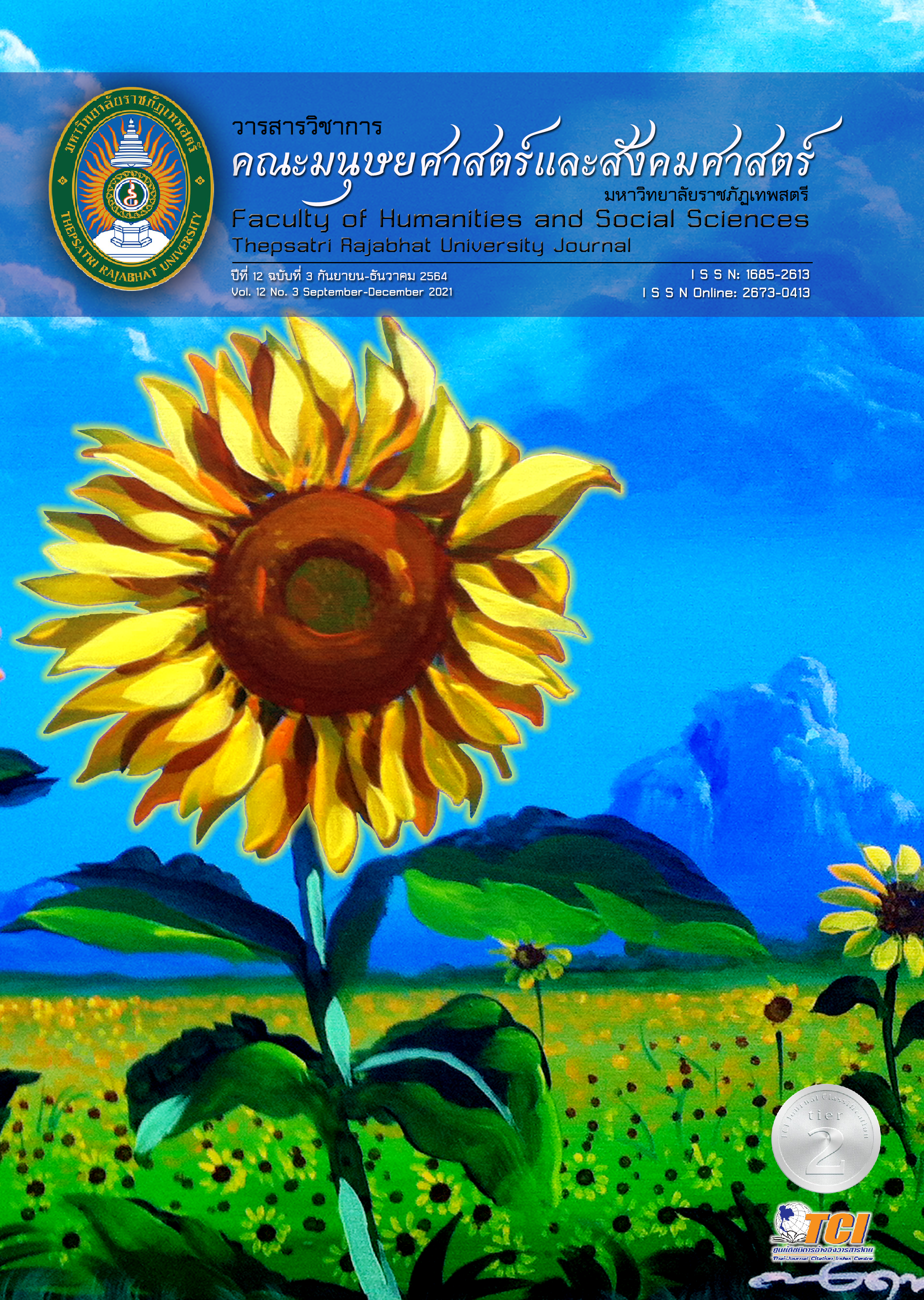Well-Being and Social Networking Promotion to Reduce Health Risk Factors by Integrating Buddhism in Lop Buri Province Well-Being and Social Networking Promotion to Reduce Health Risk Factors by Integrating Buddhism in Lop Buri Province
Main Article Content
Abstract
The research aimed to study well-being and social networking promotion to reduce health risk factors by integrating Buddhism in Lop Buri province. Data collected by summarize of lessons from the focus group discussion of 36 key informants from 6 temples/communities by purposive sampling. Using concrete, positive activities as a tool. Moreover, all data were analyzed through content analysis method. The crucial result founded that well-being and social networking promotion to reduce health risk factors by integrating Buddhism in Lop Buri province, were; 1) Building engagement; there are monks who have leadership style, vision for collaborative development. They use discussion for assign and follow up periodic operations, public relations communication to create and participate in activities encourage collaboration, 2) Developing the temple to be a center of learning and community activities; through important day activities and traditions. To create right livelihoods that promote virtue, free from smoke, alcohol, drugs and gambling. There is a space for children and youth to learn, develop their potential, work and carry on the local culture and customs. Honoring role models in the community, and 3) Application of Buddhist Dharma according to Five Precepts, Five Dharma and Dharma of householder; In accordance with the science of the King Rama 9, sufficiency economy philosophy and community context (local wisdom and community potential). Focus on target groups who are interested to learning, understanding Buddhism and put it into action.
Downloads
Article Details
The content and information presented in articles published in the Academic Journal of the Faculty of Humanities and Social Sciences, Thepsatri Rajabhat University, are solely the opinions and responsibilities of the respective authors. The editorial board of the journal neither necessarily agrees with nor assumes any responsibility for such content in any manner whatsoever.
All articles, information, content, and images published in the Academic Journal of the Faculty of Humanities and Social Sciences, Thepsatri Rajabhat University, are the copyright of the journal. Any person or organization wishing to reproduce, disseminate, or otherwise utilize all or any part thereof must obtain prior permission from the Academic Journal of the Faculty of Humanities and Social Sciences, Thepsatri Rajabhat University.
References
กรมส่งเสริมการปกครองส่วนท้องถิ่น. (2561). คู่มือการดำเนินงานโครงการวัด ประชา รัฐ สร้างสุข: พัฒนาวัดตามแนวทาง ๕ส ที่ทุกภาคส่วนมีส่วนร่วม. กรุงเทพฯ: กรมส่งเสริมการปกครองท้องถิ่น.
กองสนับสนุนสุขภาพภาคประชาชน กรมสนับสนุนบริการสุขภาพ กระทรวงสาธารณสุข. (2556). หลักสูตรฝึกอบรมมาตรฐานอาสาสมัครสาธารณสุข (อสม.) ปีพุทธศักราช 2556. กรุงเทพฯ.
เกียรติสุดา ศรีสุข. (2556). ระเบียบวิธีวิจัย (พิมพ์ครั้งที่ 3). เชียงใหม่: มหาวิทยาลัยเชียงใหม่.
วิวัฒน์ โรจนพิทยากร. (2562). สถานการณ์และแนวโน้มทางสุขภาพของประเทศไทย ปี 2561-2563. วารสารวิชาการสาธารณสุข, 28(2), 185-185.
พระครูสันติวชิรกิจ (วิโมกข์), พระมหาดวงเด่น ฐิตญาโณ, และขันทอง วัฒนะประดิษฐ์. (2559). แนวทางการมีส่วนร่วมของภาคประชาชนในการขับเคลื่อนโครงการหมู่บ้านรักษาศีล 5: กรณีศึกษาชุมชนบ้านโนนดุม จังหวัดกำแพงเพชร. วารสารสันติศึกษาปริทรรศน์ มจร. 5(ฉบับพิเศษ), 1-16.
พระพรหมคุณาภรณ์ (ป.อ.ปยุตฺโต). (2554). โพชฌงค์พุทธวิธีเสริมสุขภาพ (พิมพ์ครั้งที่ 10). กรุงเทพฯ: อักษรสัมพันธ์ (1987).
ภิรมย์ กมลรัตนกุล, และวิโรจน์ เจียมจรัสรังสี. (2549). แนวคิดใหม่เกี่ยวกับ “สุขภาวะ” และ “การเสริมสร้างสุขภาวะ” จุฬาลงกรณ์เวชสาร, 50(5), 291-300.
รัตนะ บัวสนธ์. (2558). การวิจัยเชิงคุณภาพทางการศึกษา. กรุงเทพฯ: จุฬาลงกรณ์มหาวิทยาลัย.
วณิฎา ศิริวรสกุล, และวัชรินทร์ อินทพรหม. (2561). รูปแบบการขับเคลื่อนนโยบายหมู่บ้านรักษาศีล 5 ให้ประสบความสำเร็จ. วารสารวิชาการมหาวิทยาลัยธนบุรี, 12(29), 203-209.
สุภางค์ จันทวานิช. (2553). วิจัยเชิงคุณภาพ (พิมพ์ครั้งที่ 18). กรุงเทพฯ: จุฬาลงกรณ์มหาวิทยาลัย.
สำนักงานเครือข่ายองค์กรงดเหล้า. (2562). สรุปบทเรียนชุมชนคนสู้เหล้าในจังหวัดภาคกลาง. กรุงเทพฯ: มูลนิธิเครือข่ายองค์กรคนงดเหล้า.
สำนักงานสถิติแห่งชาติ. (2558). รายงานผลการสำรวจพฤติกรรมการสูบบุหรี่และการดื่มสุราของประชากร พ.ศ. 2558. กรุงเทพฯ: สำนักงานสถิติแห่งชาติ.
สำนักงานโครงการสร้างความปรองดองสมานฉันท์ โดยใช้หลักธรรมทางพระพุทธศาสนา “หมู่บ้านรักษาศีล 5”. (2558). คู่มือแนวทางการดำเนินงานโครงการสร้างความปรองดองสมานฉันท์ โดยใช้หลักธรรม ทางพระพุทธศาสนา “หมู่บ้านรักษาศีล 5” ระยะที่ 3 (ระยะยาว). นครปฐม: สำนักงานพระพุทธศาสนาแห่งชาติ.


